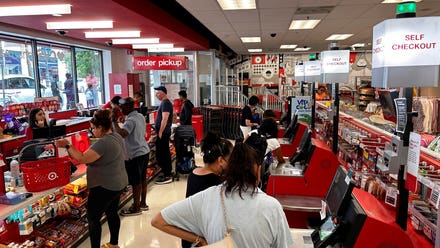I Will Live To See The Last Check

- Share to Facebook
- Share to Twitter
- Share to Linkedin
Busy Self checkout vs busy cashier check out at Target Store, Queens, New York. (Photo by: Lindsey … [+]
UCG/Universal Images Group via Getty Images
The Deputy Manager of the American Bankers Association, Dale Reistad, made an interesting speech setting out a vision for the industry. He told the Midwest Economics Association that innovations may “eliminate the need for numerous credit cards, checks – and, perhaps, cash – and at the same time expand and simplify customer services”. I couldn’t agree more, and I think it’s pretty interesting, given Visa’s recent announcements, that he goes on to say that in the future “one bank ID card would provide identification, unlock the customer’s bank account and serve also as the key to his [record at a]
credit bureau”. Oh, I forgot to mention, he made this speech in 1967.
Check Dynamics
Back in the Summer of Love, Mr. Reistad said that what he called “checkless” banking “may replace our current system as early as 1980”. It didn’t. Well, it didn’t in the United States. I can’t remember the last time I used, or even saw, a cheque in our United Kingdom and they have vanished from view in many other countries. When I lived in California in the 1980s I was surprised by the thick check book my bank gave me. My son was just as surprised when he moved to California four decades later and was presented with an entirely similar artefact of payments past. It was as if he had been asked to pay his rent using doubloons.
Double check.
© Helen Holmes (2024).
And yet… I was thinking about Dale’s speech today because I was surprised to discover what I think future economic historians will label a weak signal for change: As of today, Target will no longer accept personal checks as a form of payment. Yes, that’s correct. Checks, along with foreign currency, mall gift cards, money orders and sunry other retail payment mechanisms are no longer valid in Target stores due what a spokesperson called “extremely low volumes” of the once popular paper payment process. And unlike other antiquated payment system such as cash, checks won’t hang around as a niche service: as I wrote a decade back, while we digitised checks (using remote deposit capture and check imaging) the rump will be bypassed using account-to-account credit transfers. No matter how digitised, they can’t hold on. The costs of the paper infrastructure are falling on fewer and fewer checks and we are raising a generation that simply doesn’t get them. Checks are on target to be the first payment mechanism to vanish in my lifetime.
The US is seeing the same trends. According to the Federal Reserve, the number of payments made by check has been declining, dropping 7.2% annually between 2018 and 2021, with a total of 11.2 billion that year. However, the average value of check payments has increased from $1,908 in 2018 to $2,340 in 2021, indicating that although people are writing fewer checks, they are using them for larger transactions — and therefore are less likely to use them fto buy groceries or gas anyway. Those larger transactions are going electronic as well. It’s a couple of years since Bank of America customer made more Zelle transfers than check payments and in the first quarter of this year The Clearing House’s RTP network processed 76 million transactions worth $42 billion.
There is another driver for getting rid of checks though, as Erin McCune, one of the leading experts on US business-to-business payments, notes: While check use is declining, check fraud is on the rise. She points out that banks reported ~680,000 incidents of check fraud in 2022, nearly 2x the number reported in 2021 according to FinCEN and according to the Association for Finance Professionals, checks are by far the most common source of attempted or actual business payments fraud.
Best High-Yield Savings Accounts Of 2024
By
Best 5% Interest Savings Accounts of 2024
By
The Last Check
Whether it is the cost of the infrastructure or the cost of fraud that drives the final nail into the check’s coffin, they are already in the coffin. So how much longer do they have? I don’t want checks, my kids don’t want checks even my gardener doesn’t want checks and the plight of gardeners was (as I recall) central to the debate about the future of checks in this United Kingdom when many years ago we had a payment strategy that planned to end check clearing in 2018 which, for a variety of reasons, never happened (and now we don’t have payments strategy either).
function loadConnatixScript(document) {
if (!window.cnxel) {
window.cnxel = {};
window.cnxel.cmd = [];
var iframe = document.createElement(‘iframe’);
iframe.style.display = ‘none’;
iframe.onload = function() {
var iframeDoc = iframe.contentWindow.document;
var script = iframeDoc.createElement(‘script’);
script.src = ‘//cd.elements.video/player.js’ + ‘?cid=’ + ’62cec241-7d09-4462-afc2-f72f8d8ef40a’;
script.setAttribute(‘defer’, ‘1’);
script.setAttribute(‘type’, ‘text/javascript’);
iframeDoc.body.appendChild(script);
};
document.head.appendChild(iframe);
const preloadResourcesEndpoint = ‘https://cds.elements.video/a/preload-resources-ovp.json’;
fetch(preloadResourcesEndpoint, { priority: ‘low’ })
.then(response => {
if (!response.ok) {
throw new Error(‘Network response was not ok’, preloadResourcesEndpoint);
}
return response.json();
})
.then(data => {
const cssUrl = data.css;
const cssUrlLink = document.createElement(‘link’);
cssUrlLink.rel = ‘stylesheet’;
cssUrlLink.href = cssUrl;
cssUrlLink.as = ‘style’;
cssUrlLink.media = ‘print’;
cssUrlLink.onload = function() {
this.media = ‘all’;
};
document.head.appendChild(cssUrlLink);
const hls = data.hls;
const hlsScript = document.createElement(‘script’);
hlsScript.src = hls;
hlsScript.setAttribute(‘defer’, ‘1’);
hlsScript.setAttribute(‘type’, ‘text/javascript’);
document.head.appendChild(hlsScript);
}).catch(error => {
console.error(‘There was a problem with the fetch operation:’, error);
});
}
}
loadConnatixScript(document);
(As I said at the time, “When someone sends you a cheque, it’s like being set homework.”)
Mike Chambers, an expert on the UK’s payment systems (he used to run them) compared the predictions of ChatGPT and a data analyst. ChatGPT predicted that the UK’s last check might be written between 2030 and 2035 whereas the data analyst looked at the data from April 2020 to April 2024 ansd predicted that the last check in the UK will be processed on the 22 January 2029. I think I might side with the artificial brain on this one. People are notoriously convervative about money, banking and payments, so I think checks might hand on for a bit. But will I live to see the last check written in Britain? Actually, I think I might.



